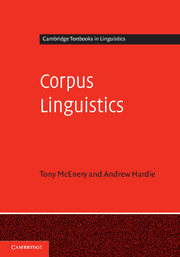Book contents
- Frontmatter
- Contents
- List of figures
- List of tables
- Acknowledgements
- Preface
- 1 What is corpus linguistics?
- 2 Accessing and analysing corpus data
- 3 The web, laws and ethics
- 4 English Corpus Linguistics
- 5 Corpus-based studies of synchronic and diachronic variation
- 6 Neo-Firthian corpus linguistics
- 7 Corpus methods and functionalist linguistics
- 8 The convergence of corpus linguistics, psycholinguistics and functionalist linguistics
- 9 Conclusion
- Glossary
- Notes
- References
- Index
3 - The web, laws and ethics
Published online by Cambridge University Press: 05 June 2012
- Frontmatter
- Contents
- List of figures
- List of tables
- Acknowledgements
- Preface
- 1 What is corpus linguistics?
- 2 Accessing and analysing corpus data
- 3 The web, laws and ethics
- 4 English Corpus Linguistics
- 5 Corpus-based studies of synchronic and diachronic variation
- 6 Neo-Firthian corpus linguistics
- 7 Corpus methods and functionalist linguistics
- 8 The convergence of corpus linguistics, psycholinguistics and functionalist linguistics
- 9 Conclusion
- Glossary
- Notes
- References
- Index
Summary
Introduction
In this chapter we will continue our survey of practical issues that may arise when working with corpus data. While the first two chapters discussed the selection, annotation and exploitation of the data in a corpus, in this chapter we will consider two important and related issues: legal considerations in corpus construction; and the equally important, yet less often discussed, ethical issues arising from corpus construction, distribution and use. We will begin with the legal issues, which have become more pressing over time as vast amounts of textual data have become available to collect easily over the World Wide Web. Accordingly, in this chapter we will approach legal issues in corpus construction with specific reference to compiling corpora from the web. In doing so, we will also consider some of the practical issues around web-based corpus construction.
We should note that we write, in this chapter, very much from the standpoint of Western culture. Laws and ethics vary across the planet – but rather than attempt a global survey, we seek here to illustrate the relevant legal and ethical issues from the context in which our own research is undertaken.
- Type
- Chapter
- Information
- Corpus LinguisticsMethod, Theory and Practice, pp. 57 - 70Publisher: Cambridge University PressPrint publication year: 2011



